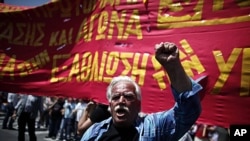After two, huge financial bailouts in the past three years, the reputation of the two main traditional parties in Greece - the Socialists and the Conservatives - has suffered. Greek voters are heading into a general election Sunday wondering whether mainstream politics and politicians are still relevant.
Sunny Rethimno harbor, located on the northern coast of Crete features a sapphire-blue sea on one side and snow-capped mountains on the other. It is just a few days before the start of the tourist season. Bars and restaurants are starting to fill up. Locals say they have weathered Greece's austerity plans better than in the capital, Athens.
Tourism
Last year’s tourist season was good because of protests in North Africa deterring travel there. But this year is not so good. Residents say German tourists are wary of being insulted, and American tourists are scared of being caught in a riot.
One hotel manager said he thought this summer would be “catastrophic.”
Voter discontent
Many Greeks blame the two main parties for the corruption and mismanagement that have put Greece in its present bind. The parties are expected to lose half their seats.
The Socialist deputy mayor of Rethimno, Pepi Birliraki, says Greek voters have a right to be edgy.
"I am afraid we made a lot of mistakes," said Birliraki. "Nevertheless, I believe that we can overcome it. I know that we are just starting to learn from our mistakes. And I do know that we do have the force and the power to be stronger, wiser.”
Many young Greeks feel betrayed by the older generation.
Take Sifis Mamalakis and Stelios Stavridakis are two restaurant-owners in the town. Mamalakis is not going to vote. He has lost trust in the main parties.
"I think that showing the government that the majority of people is not going to vote means something," said Mamalakis. "I believe it is much bigger than going to vote for the small parties.”
Who to vote for
Stavridakis is equally frustrated with politicians from his parents' generation, but, unlike Mamalakis, he says he will vote for one of the smaller parties.
"Abstaining or not going to vote does not solve the problem," said Stavridakis. "You are part of the problem so you have to go to vote, in my opinion. If you do not vote, a big percentage will go to the two big parties that are first.”
Sunday’s election will radically change the makeup of Greek politics. The big traditional parties will be weaker.
The more than 10 smaller parties that will gain seats are against austerity imposed by the European Union. Many want out of the eurozone. If their presence in parliament is big enough, they might one day get their way. The consequences of that are unknown, but even now, Greeks are looking into an uncertain future.







